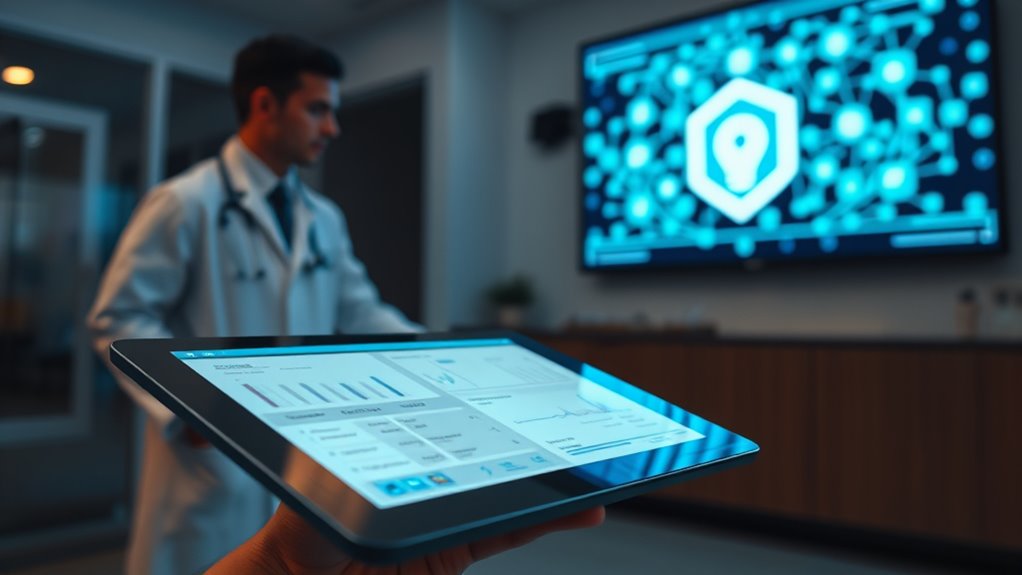Blockchain offers a secure, transparent way to protect your health records by creating tamper-proof, cryptographically secured data. Its decentralized structure prevents unauthorized access and guarantees data integrity, while smart contracts automate access control. Blockchain also provides patients with greater control over their information and supports interoperability across healthcare systems. If you want to understand how these features work together to enhance healthcare security, there’s more to explore below.
Key Takeaways
- Blockchain provides tamper-proof, cryptographically secure records for health data, ensuring data integrity and trustworthiness.
- Decentralized architecture prevents unauthorized access and single points of failure in health record management.
- Smart contracts automate access controls, enabling patients to securely share their health data with providers.
- Immutable audit trails track all data access and modifications, enhancing transparency and accountability.
- Blockchain supports compliance with regulations like HIPAA and GDPR through secure, interoperable data ecosystems.
Understanding the Need for Enhanced Healthcare Data Security

Healthcare data security is more critical than ever, as the sector faces frequent and costly breaches. Over 41 million healthcare records were compromised in just the first half of 2023, showing how vulnerable current systems remain. Traditional centralized healthcare data systems create single points of failure, increasing the chances of large-scale data breaches and tampering. Continuous monitoring of AI behavior is essential to mitigate risks associated with these vulnerabilities. Additionally, email security insights highlight the importance of implementing advanced protective measures to safeguard sensitive information. In a similar manner, celebrity relationships often face scrutiny and pressure, demonstrating how public trust can be fragile.
When sensitive medical records are stolen or altered, it damages patient trust and compromises privacy. Costs from data breaches average over $7 million per incident, highlighting the urgent need for stronger security measures. Blockchain technology offers a promising solution by providing a tamper-proof, cryptographically secure way to protect health information. Implementing blockchain can considerably improve data security, giving patients more control and restoring trust in healthcare data management. Additionally, enhancing security measures can lead to a decrease in data breach costs, ultimately benefiting both healthcare providers and patients. Furthermore, open communication about data security practices can help build confidence and reassurance among patients regarding their healthcare information.
How Blockchain Ensures Data Integrity and Privacy

Blockchain guarantees data integrity and privacy through robust cryptographic techniques and a decentralized structure. You can trust that each transaction is secured with cryptography, creating an immutable record that prevents tampering. Its decentralized architecture eliminates single points of failure, safeguarding your health records from unauthorized access. AI security solutions can enhance the protection of your data by mitigating risks associated with breaches. Access control systems let you regulate who views or edits your data, maintaining your privacy. Dynamic communication exercises can help improve trust in data sharing among healthcare providers. The philosophy of utilitarianism emphasizes the importance of maximizing overall well-being, which is relevant in the context of healthcare data management. Encryption and digital signatures verify data authenticity, ensuring only authorized parties can access sensitive info. The blockchain’s immutable audit trail transparently tracks all data access and changes, reinforcing trust. Additionally, the importance of data security is critical as it protects sensitive health information from unauthorized access and tampering. Compliance with regulations ensures that data handling practices align with legal standards, further safeguarding your privacy.
| Trust | Security | Privacy |
|---|---|---|
| Your data is protected from tampering. | Unauthorized access is prevented. | You control who sees your health info. |
Key Features of Blockchain Technology in Healthcare

One of the standout features of blockchain technology in healthcare is its ability to create an immutable ledger that records all data transactions with cryptographic hashes. This guarantees the security and integrity of health records, making tampering nearly impossible.
Blockchain supports privacy through private and public key cryptography, giving you control over who accesses your data and when.
Smart contracts automate essential healthcare processes like authorization, data sharing, and claims processing, reducing manual errors and boosting efficiency.
Additionally, blockchain maintains a transparent audit trail of all data access and modifications, increasing accountability among providers.
Its decentralized architecture minimizes risks of data breaches and single points of failure, profoundly enhancing the overall security and reliability of health records.
Real-World Examples of Blockchain in Medical Records Management

You can see how blockchain is transforming healthcare through real-world examples like Kenya’s Snark Health, which enhances transparency and reduces fraud. This innovation can be compared to how marinated olives and feta offer a rich combination of flavors, showcasing the importance of enhancing traditional practices with modern solutions. Additionally, implementing effective relaxation techniques can improve patient outcomes by reducing stress during medical processes. The use of blockchain can also streamline asset division in healthcare, ensuring that patient records are accurately and securely maintained. Furthermore, expert voice actors in healthcare communications can enhance the clarity of patient information, leading to better understanding and engagement.
In Tanzania, AID:Tech secures medical data and streamlines aid distribution, while Uganda’s Mediconnect puts patients in control of their records. These implementations showcase blockchain’s potential to improve security, interoperability, and trust across diverse healthcare systems. Additionally, the growing trend of no-sugar-added brands emphasizes the importance of health-conscious choices in overall wellness.
Kenya’s Snark Health
How is Kenya leveraging innovative technology to transform healthcare records? Kenya’s Snark Health uses blockchain to enhance the security and transparency of medical records across local healthcare facilities.
This platform allows patients to control their health data, granting access permissions to providers and researchers via a secure, decentralized ledger. By adopting blockchain, Snark Health reduces the risk of data breaches and fraud, ensuring tamper-proof record keeping for millions of patient interactions. Additionally, a healthy breakfast can help set a positive tone for the day, much like how blockchain enhances data integrity in healthcare. The integration of automation technologies in healthcare can further streamline operations and improve patient care outcomes. Regular maintenance of smart home integration can also help ensure that healthcare technology functions optimally.
The system supports real-time data sharing among authorized parties, enabling faster diagnosis, treatment, and research collaboration. Kenya’s implementation of blockchain in medical records demonstrates its potential to solve long-standing data management challenges, improving security and efficiency in the country’s healthcare sector. Additionally, cold air intakes can optimize performance in various applications, showcasing how technology can enhance both healthcare and automotive efficiency.
Tanzania’s AID:Tech Initiatives
Have you ever wondered how blockchain can improve healthcare access for underserved communities? In Tanzania, AID:Tech uses blockchain to securely verify and manage health records for those with limited infrastructure. This technology creates tamper-proof digital health certificates, boosting trust and transparency in health data sharing. Additionally, the platform allows patients to choose from a variety of preppy dog names, enhancing their connection to their digital identities. The implementation of portable camping toilets in remote areas could also contribute to better overall health outcomes by ensuring sanitation during medical outreach programs. Regular prenatal check-ups are essential for monitoring fetal development, which can be facilitated through secure health record sharing. The importance of community support in early parenthood cannot be underestimated, as it provides families with essential resources and encouragement.
The platform allows patients to control access to their health records, making it easier to share information with healthcare providers and organizations. By utilizing blockchain’s immutable ledger, the system enhances data security and reduces fraud.
These initiatives have particularly improved health data accuracy and accessibility, especially in rural areas. With blockchain, health records become more reliable and accessible, strengthening trust among patients and providers and ensuring secure data management in challenging environments. Additionally, this technology aligns with the mission to inspire travelers of all kinds to hit the road with confidence, promoting a spirit of discovery not only in travel but also in healthcare innovation.
Uganda’s Mediconnect Platform
Uganda’s Mediconnect platform leverages blockchain technology to securely manage and share patient medical records, substantially enhancing data integrity and access control. By utilizing a tamper-proof ledger, Mediconnect ensures healthcare data remains unaltered and trustworthy. It enables real-time sharing among healthcare providers, patients, and authorized entities, reducing delays and improving care coordination. This system has been piloted in Ugandan healthcare facilities, demonstrating its ability to cut fraud, improve data transparency, and streamline medical record management. The platform supports secure storage, long-term record retention, and interoperability across the healthcare system.
| Feature | Benefit | Impact |
|---|---|---|
| Blockchain | Tamper-proof, verifiable data | Trust among stakeholders |
| Real-time sharing | Faster health info access | Better patient care |
| Secure storage | Protects sensitive healthcare data | Reduced fraud |
| Data transparency | Clear, auditable medical records | Increased accountability |
| Interoperability | Seamless health system integration | Improved health outcomes |
Overcoming Challenges in Implementing Blockchain Solutions

Implementing blockchain in healthcare requires you to address significant hurdles like integrating it with existing systems and maneuvering complex regulations.
You’ll need to develop strategies for compatibility, privacy, and compliance to guarantee a smooth transition.
Tackling these challenges head-on is essential for realizing the full benefits of blockchain technology in health records.
Integration With Existing Systems
Integrating blockchain technology into existing healthcare systems presents significant challenges, primarily due to compatibility issues with legacy platforms. You need to facilitate interoperability by using standards like HL7 FHIR for seamless data exchange. Data migration can be complex, requiring careful planning and phased deployment to prevent disruptions. APIs serve as vital tools, bridging gaps between blockchain networks and outdated systems. Security standards such as HIPAA guide the implementation of cryptographic measures and access controls to safeguard sensitive health data. Overcoming these hurdles involves developing custom interfaces and middleware solutions to facilitate integration while maintaining data integrity. Addressing compatibility and migration issues proactively helps you streamline the transition and access the benefits of blockchain in healthcare.
| Challenge | Solution |
|---|---|
| Compatibility with legacy systems | Middleware and API gateways |
| Data migration complexities | Phased deployment and testing |
| Interoperability issues | HL7 FHIR standards |
| Security during integration | Robust cryptography and access controls |
| Workflow adjustments | Stakeholder training and change management |
Regulatory and Privacy Hurdles
Overcoming regulatory and privacy hurdles is vital when deploying blockchain solutions in healthcare, as these challenges directly influence data sharing, security, and compliance. Ensuring regulatory compliance with laws like HIPAA and GDPR complicates data privacy management, especially given the immutable nature of blockchain, which conflicts with regulations requiring data modification or deletion upon patient request.
Variations in international data privacy laws create cross-border compliance complexities, hindering global adoption. Establishing clear legal frameworks and standardized protocols is essential for addressing concerns around data sovereignty, patient consent, and secure identity verification.
Without these frameworks, implementing blockchain for health records risks legal conflicts and breaches of data security. Overcoming these hurdles requires aligning blockchain solutions with existing legal frameworks while safeguarding patient rights and maintaining trust.
Cost Considerations for Blockchain-Based Healthcare Systems

Developing a blockchain-based healthcare system involves significant costs that vary widely depending on your project’s scope and complexity. Blockchain costs for health records can range from $80,000 to $150,000 for MVPs, while full-scale solutions might cost over $1.5 million.
System development expenses depend on the type of blockchain network you choose—private, consortium, or hybrid—affecting setup and maintenance.
Integrating with existing healthcare software, like patient portals and lab systems, can raise costs due to necessary customization.
Security expenses, including secure data storage and compliance measures, also add to the implementation price.
Keep in mind, operational costs like cloud hosting, ongoing maintenance, and security updates influence the total investment.
Your project’s size, transaction volume, and regulatory requirements ultimately shape the overall costs.
The Role of Smart Contracts and Cryptography in Securing Data

Have you ever wondered how blockchain keeps health data secure and compliant? It’s through smart contracts and cryptography working together. Smart contracts use programmable code to automate access control and data sharing, ensuring healthcare regulations like HIPAA are met.
Cryptography encrypts health records with algorithms like AES or RSA, making unauthorized access nearly impossible. Blockchain’s cryptographic hashing, such as SHA-256, creates unique digital fingerprints for each record, enabling tamper detection and maintaining data integrity.
Smart contracts can automatically grant or revoke patient access based on predefined rules, ensuring secure data transactions. End-to-end cryptographic protocols guarantee only authorized parties can decrypt and view sensitive health information, protecting patient privacy while maintaining the security and integrity of health records.
Future Trends and Potential of Blockchain in Healthcare Security

The future of blockchain in healthcare security looks promising, with rapid growth driven by innovative solutions that automate and strengthen data protection. You can expect blockchain security to become central in creating tamper-proof, interoperable health data ecosystems, reducing vulnerabilities. Emerging blockchain solutions use smart contracts and cryptographic protocols to automate access controls, improving data protection and reducing reliance on traditional security. Future developments include blockchain-based identity verification systems that give you more control over your healthcare data and minimize identity theft risks. Industry forecasts predict that advances in governance and compliance protocols will align with regulations like HIPAA and GDPR, ensuring secure record management. Here’s an overview of future trends:
| Trend | Impact | Technology |
|---|---|---|
| Rapid adoption growth | Enhanced security frameworks | Blockchain security |
| Automated access controls | Reduced security reliance | Smart contracts |
| Identity verification | Better patient control | Blockchain-based systems |
| Interoperable health data | Seamless data sharing | Blockchain ecosystems |
| Regulatory alignment | Secure, compliant data handling | Governance protocols |
Steps to Adopt Blockchain for Your Healthcare Data Infrastructure

To successfully adopt blockchain for your healthcare data infrastructure, start by conducting a thorough needs assessment to identify current data management challenges and determine how blockchain can improve security, interoperability, and patient control.
Begin your healthcare blockchain journey with a comprehensive needs assessment to identify challenges and potential improvements.
This evaluation helps you understand where blockchain can add value in managing health records and enhancing data security. Next, develop a tailored blockchain infrastructure plan, choosing the appropriate network type—private, consortium, or hybrid—and ensure compliance with standards like HIPAA and GDPR.
Pilot the implementation with a limited scope, such as integrating blockchain with existing EHR systems for specific departments, to evaluate functionality, security, and user adoption. Engage stakeholders—patients, providers, regulators—in training and feedback to foster trust.
Then, gradually scale deployment, incorporating ongoing support, updates, and security audits to ensure long-term success and compliance.
Frequently Asked Questions
Can Blockchain Be Used for Medical Records?
You might wonder if blockchain can be used for medical records. Yes, it can! Blockchain offers a secure, tamper-proof way to store and share health data.
It puts you in control, letting you grant or revoke access easily. Plus, it helps different healthcare systems work together smoothly, ensuring data stays accurate and accessible in real-time.
Smart contracts automate permissions, making record management more transparent and efficient.
How Is Blockchain Used in Healthcare?
You might think blockchain isn’t suitable for healthcare, but it actually transforms how data is managed. It secures records with cryptography, giving you control over who accesses your information.
Providers can share data instantly and securely, improving care.
Smart contracts automate processes like billing and consent, making everything more efficient.
Can Blockchain Be Used for Record Keeping?
You might wonder if blockchain can be used for record keeping. The answer is yes. It offers an immutable, secure ledger that keeps your data tamper-proof and accessible only to authorized parties.
Its decentralized system means no single point of failure, and smart contracts automate access permissions.
With cryptography, it also helps you stay HIPAA-compliant, making blockchain a reliable choice for secure, efficient record management across various industries.
What Is the Security of Blockchain in Healthcare?
You want to know about blockchain’s security in healthcare. It offers strong protection by making records tamper-proof and immutable through cryptographic hashing.
Its decentralized design reduces risks of data breaches, while access controls via private keys and smart contracts limit who can see or change info.
Plus, blockchain provides transparent audit trails, making it easier for you to detect unauthorized access or tampering quickly, ensuring your health data stays safe.
Conclusion
Embracing blockchain in healthcare is like planting a sturdy tree in a storm—offering strong roots of security and trust. By harnessing its features, you can protect patient data like a fortress, ensuring privacy and integrity. While challenges exist, the future shines bright with endless possibilities. Take the leap today, and let blockchain be the guiding light that turns your healthcare data into a well-guarded treasure chest, safe and sound for years to come.









